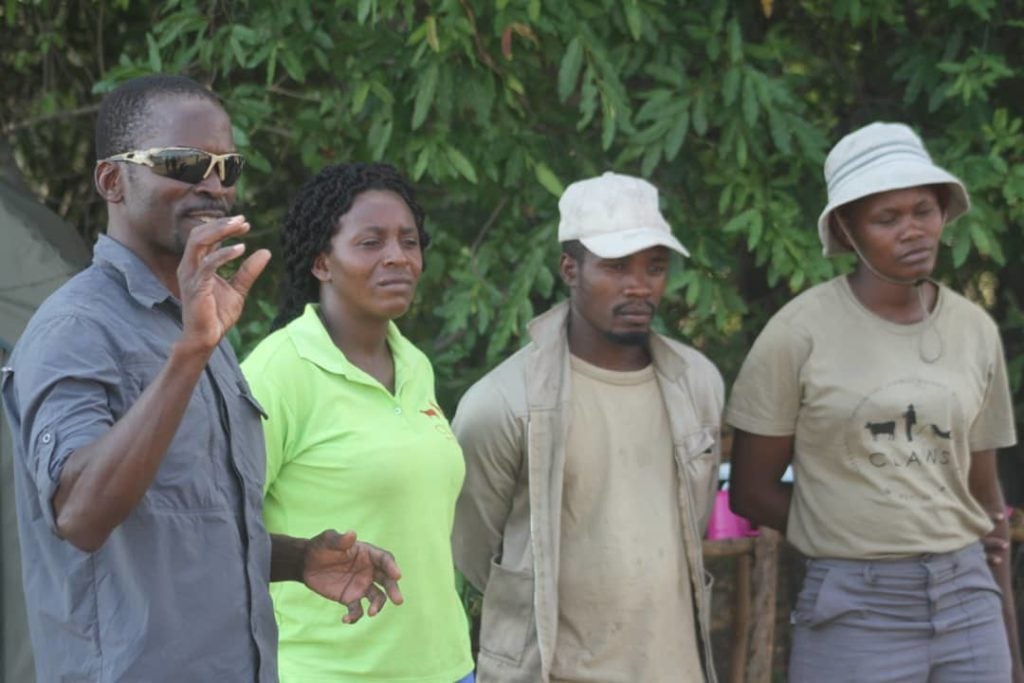Women in Botswana’s Okavango Delta take the lead in lion conservation
Fending off lions, supervising a team of male herders is a departure from domestic chores

By Boniface Keakabetse for Okavango Express
Despite their threatened status, lions are one of the most feared predators in the African wild but in Botswana’s Okavango Delta, women are taking the lead in conserving the big cats.
In her early thirties, Kelebogile Moitshoi and her team of cattle herders regularly fend off lions and other dangerous wildlife from attacking cattle in the remote village of Eretsha as part of a sustainable project aimed at providing solutions to human wildlife conflict in the area.
Living in a traditional community where women's work is dominated by domestic chores or
tending crops, Moitshoi is one of few women in the Okavango Delta who is defying stereotypes and carving a niche in conservation work.
As participant in CLAWS Conservancy Botswana’s herding project in Eretsha village, Moitshoi went to South Africa for a year to study at Herding Academy, and she is now responsible for a group of herders who mainly include men. She supervises herders at Eretsha mobile quarantine, one of the sustainable projects implemented by CLAWS in Eretsha.
Moitshoi told journalists during a recent media tour of CLAWS projects in Eretsha as part of Space for Giants Conservation Journalism Programme: “As women we are capable of occupying the same roles in conservation work as men. All we need is for someone like CLAWS to give us an opportunity and we excel.”
Moitshoi explained: “When herding cattle, we have a system we observe. Our system consists of four people moving the cattle: one at the back to drive the cattle; two people on both flanks or sides to keep the cattle together so they do not spread out; and one person in the front is the leader of the herd. The leader keeps a lookout for potential predators, assessing the ground for predator tracks, and also assesses the vegetation to ensure it is healthy for grazing and free from poisonous plants. When satisfied the herd leader will give a signal for the herd to stop and graze.’’
Asked if she had been in contact with lions while herding, she responded, “Yes, twice it happened, but we managed to drive them away.’’
Moitshoi is not the only woman working in this project but there are a couple of others in the local committees for this project.
The CLAWS Conservancy is a registered nonprofit whose mission is to develop innovative approaches to promote human wildlife coexistence. Their focus is on high-priority species and known conflict areas. They are currently implementing a herding project in Eretsha which aims to save lion populations from retaliatory attacks through a holistic approach involving the farmers in the area.
Eretsha and neighbouring villages located in an area commonly referred to as the Okavango Panhandle in northern Botswana have the highest cases of human-lion conflicts. Lions are often poisoned in retaliation for killing livestock belonging to local communities. The same happens in wildlife areas across the continent, with 50% of Africa’s lions having disappeared in the last 25 years.
A UNESCO world Heritage site, the Okavango Delta is home to one of Africa’s largest lion populations. However, in 2013 incidents of lion poisoning rose dramatically due to retaliation. 50 percent of lion mortalities were as a result of the farmers retaliating when lions kill their livestock. This is what motivated the CLAWS project.
On the wheels of a Toyota off-road Landcruiser, Dr. Andrew Stein, founder and director of CLAWS Conservancy, talks to journalists at the back of the vehicle while navigating the sandy terrain. Dr. Stein is leading a search for one of the collared lions whose movement closer to cattle farms has been observed.
Dr Stein explains as he drives that their partnership with the University of Siegen, in which they designed a one-of-a-kind lion alert system, which warns villagers when collared lions approach livestock areas. Over 120 participants who receive messages to their specific preferences (text or voice message) in Setswana and English including the names and distance of the specific lion.
‘’It is one of the challenges for all organisations involved in conservation work to think outside the box,” says Dr. Stein. “We can’t focus exclusively on the lions themselves. We have to include community development models into conservation to bring community developments so the community see the need to be partners in conservation.’’
Since commencement the herding programme has seen lots of interest from the community.
“So far, we have nearly 700 cattle from 30 owners participating from Eretsha Village - representing 50 per cent of the village herd,” said Dr. Stein.
The majority of the farmers are joining the programme for the health benefits for their cattle – vaccinations, treatments for infections, feeding of supplements, better market access for their beef and assistance with protection against predators.
In November 2022, the first of its kind mobile quarantine in Botswana piloted through the CLAWS project in Eretsha sent 27 cattle to the Botswana Meat Commission and farmers were paid premier prices after their cattle had satisfied all the health requirements. By the end of 2023 the CLAWS project plans to have sent almost 100 animals to the market from its combined herding programme.
This article is reproduced here as part of the African Conservation Journalism Programme, funded in Angola, Botswana, Mozambique, and Zimbabwe by USAID’s VukaNow: Activity. Implemented by the international conservation organization Space for Giants, it aims to expand the reach of conservation and environmental journalism in Africa, and bring more African voices into the international conservation debate. Written articles from the Mozambican and Angolan cohorts are translated from Portuguese. Broadcast stories remain in the original language.
Read the original story here:
Join our commenting forum
Join thought-provoking conversations, follow other Independent readers and see their replies
Comments
Bookmark popover
Removed from bookmarks